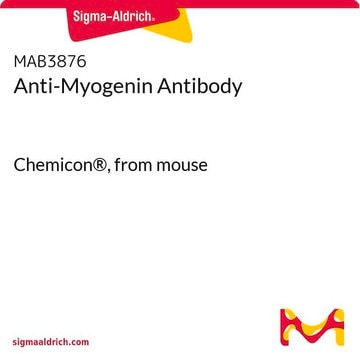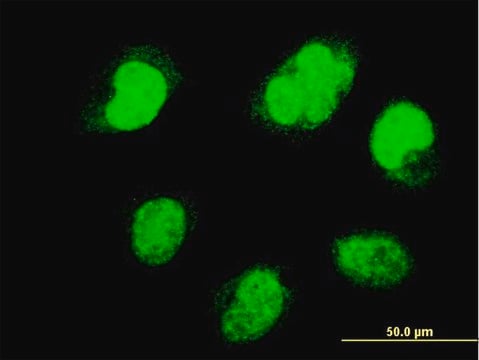Wichtige Dokumente
M5815
Monoclonal Anti-Myogenin antibody produced in mouse
clone F12B, purified immunoglobulin, buffered aqueous solution
About This Item
Empfohlene Produkte
Biologische Quelle
mouse
Qualitätsniveau
Konjugat
unconjugated
Antikörperform
purified immunoglobulin
Antikörper-Produkttyp
primary antibodies
Klon
F12B, monoclonal
Form
buffered aqueous solution
Mol-Gew.
antigen 34 kDa
Speziesreaktivität
mouse, rat, human
Methode(n)
immunohistochemistry (formalin-fixed, paraffin-embedded sections): 1-2 μg/mL using rhabdomyosarcoma tissue sections
immunoprecipitation (IP): 2 μg using 1 mg protein lysate
indirect ELISA: suitable
indirect immunofluorescence: suitable
western blot: 1 μg/mL
Isotyp
IgG1
UniProt-Hinterlegungsnummer
Versandbedingung
wet ice
Lagertemp.
−20°C
Posttranslationale Modifikation Target
unmodified
Angaben zum Gen
human ... MYOG(4656)
mouse ... Myog(17928)
rat ... Myog(29148)
Verwandte Kategorien
Allgemeine Beschreibung
Immunogen
Anwendung
Biochem./physiol. Wirkung
Physikalische Form
Haftungsausschluss
Sie haben nicht das passende Produkt gefunden?
Probieren Sie unser Produkt-Auswahlhilfe. aus.
Empfehlung
Lagerklassenschlüssel
10 - Combustible liquids
WGK
nwg
Flammpunkt (°F)
Not applicable
Flammpunkt (°C)
Not applicable
Analysenzertifikate (COA)
Suchen Sie nach Analysenzertifikate (COA), indem Sie die Lot-/Chargennummer des Produkts eingeben. Lot- und Chargennummern sind auf dem Produktetikett hinter den Wörtern ‘Lot’ oder ‘Batch’ (Lot oder Charge) zu finden.
Besitzen Sie dieses Produkt bereits?
In der Dokumentenbibliothek finden Sie die Dokumentation zu den Produkten, die Sie kürzlich erworben haben.
Kunden haben sich ebenfalls angesehen
Unser Team von Wissenschaftlern verfügt über Erfahrung in allen Forschungsbereichen einschließlich Life Science, Materialwissenschaften, chemischer Synthese, Chromatographie, Analytik und vielen mehr..
Setzen Sie sich mit dem technischen Dienst in Verbindung.










